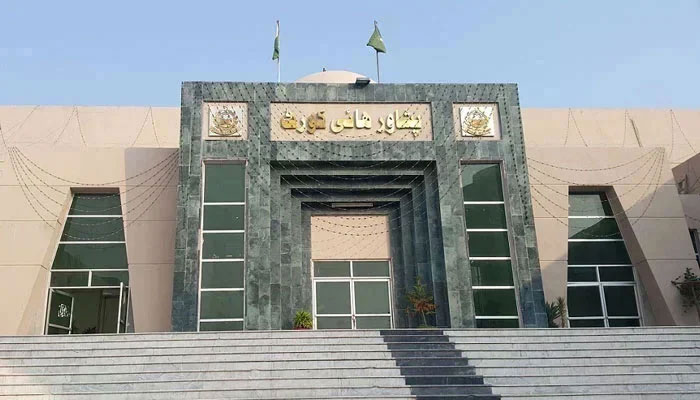PHC dismisses petition against 26th Constitutional Amendment
Petitioner’s lawyer informed court that parliament had passed 26th Constitutional Amendment
PESHAWAR: The Peshawar High Court (PHC) on Wednesday dismissed the petition filed against the 26th Constitutional Amendment.
A division bench of the PHC comprising Chief Justice Ishtiaq Ibrahim and Justice Wiqar Ahmad heard the petition filed by Najib Ahmad.
The petitioner’s lawyer informed the court that the parliament had passed the 26th Constitutional Amendment, which raised several fundamental constitutional issues.
He pleaded that the way the amendment in question was introduced and subsequently passed was fundamentally incorrect and it posed a threat to the basic structure of the Constitution.
The petitioner’s lawyer argued that on the day the amendment was passed, the National Assembly did not have the required quorum, so the amendment should be declared invalid.
He also filed supplementary petitions to include the four provincial governments as parties, along with the federal government and other additional reasons and requested the court to accept them.
Initially, the petition had included the federal secretary for law and parliamentary affairs and the government as parties, but now the petitioner wanted to include the four provincial governments and other necessary grounds.
However, Additional Attorney General Sanaullah raised objections over the maintainability of the petition.
Upon this, the bench inquired why he had not been notified, to which he responded that the petitioner had already provided him with a pre-filing notice and that he had the relevant record.
The AAG argued that if the PHC was to hear this petition, it would have to issue notices to the four provincial governments because the petitioner had filed a supplementary petition in this regard. The PHC, he added, could only issue directions within the jurisdiction of Khyber Pakhtunkhwa, so this petition was not maintainable.
He also pointed out that the Supreme Court of Pakistan’s constitutional bench had already decided to hear these cases, and they were currently under consideration there. He told the court that the PHC had not yet formed a constitutional bench, and this was a constitutional issue.
“If the PHC exercises authority for the entire country, it would be unconstitutional, as this authority belongs only to the Supreme Court of Pakistan,” he argued, adding that if the petitioner genuinely wished to file a petition, it should be withdrawn.
Upon this, the bench said that this was the initial stage, and they could not seek comments from anyone at this point.
The AAG then said that if the court wished to seek comments, it would have to consult the four provincial governments, which, constitutionally, was not possible. Therefore, the petitioner should withdraw the petition.
After hearing all the arguments, the court dismissed the petition after the petitioner opted to withdraw it.
-
 Funeral Home Owner Sentenced To 40 Years For Selling Corpses, Faking Ashes
Funeral Home Owner Sentenced To 40 Years For Selling Corpses, Faking Ashes -
 Why Is Thor Portrayed Differently In Marvel Movies?
Why Is Thor Portrayed Differently In Marvel Movies? -
 Dutch Seismologist Hints At 'surprise’ Quake In Coming Days
Dutch Seismologist Hints At 'surprise’ Quake In Coming Days -
 Australia’s Liberal-National Coalition Reunites After Brief Split Over Hate Laws
Australia’s Liberal-National Coalition Reunites After Brief Split Over Hate Laws -
 DC Director Gives Hopeful Message As Questions Raised Over 'Blue Beetle's Future
DC Director Gives Hopeful Message As Questions Raised Over 'Blue Beetle's Future -
 King Charles New Plans For Andrew In Norfolk Exposed
King Charles New Plans For Andrew In Norfolk Exposed -
 What You Need To Know About Ischemic Stroke
What You Need To Know About Ischemic Stroke -
 Shocking Reason Behind Type 2 Diabetes Revealed By Scientists
Shocking Reason Behind Type 2 Diabetes Revealed By Scientists -
 SpaceX Cleared For NASA Crew-12 Launch After Falcon 9 Review
SpaceX Cleared For NASA Crew-12 Launch After Falcon 9 Review -
 Meghan Markle Gives Old Hollywood Vibes In New Photos At Glitzy Event
Meghan Markle Gives Old Hollywood Vibes In New Photos At Glitzy Event -
 Simple 'finger Test' Unveils Lung Cancer Diagnosis
Simple 'finger Test' Unveils Lung Cancer Diagnosis -
 Groundbreaking Treatment For Sepsis Emerges In New Study
Groundbreaking Treatment For Sepsis Emerges In New Study -
 Roblox Blocked In Egypt Sparks Debate Over Child Safety And Digital Access
Roblox Blocked In Egypt Sparks Debate Over Child Safety And Digital Access -
 Savannah Guthrie Addresses Ransom Demands Made By Her Mother Nancy's Kidnappers
Savannah Guthrie Addresses Ransom Demands Made By Her Mother Nancy's Kidnappers -
 OpenAI Reportedly Working On AI-powered Earbuds As First Hardware Product
OpenAI Reportedly Working On AI-powered Earbuds As First Hardware Product -
 Andrew, Sarah Ferguson Refuse King Charles Request: 'Raising Eyebrows Inside Palace'
Andrew, Sarah Ferguson Refuse King Charles Request: 'Raising Eyebrows Inside Palace'




